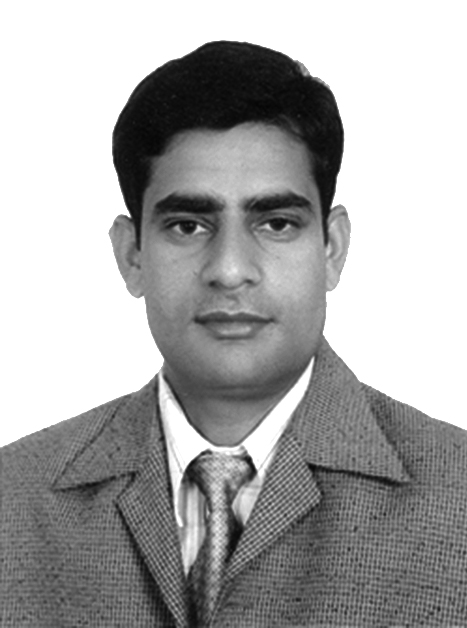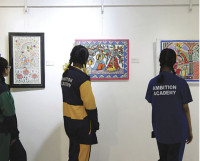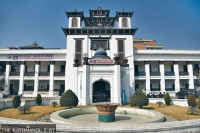Opinion
Hello goodbye
Old teachers will get a warm send-off and a new batch will move in under the golden handshake
Umesh Raj Regmi
The long-standing issue of temporary teachers in Nepal’s community schools is the most important item on the agenda for reform in the educational sector. The bill for the eighth amendment to the Education Act includes a provision under which temporary teachers can choose between quitting with a large payment, the so-called golden handshake, and competing in the Teacher’s Service Commission (TSC).
The quality of education, number of students, quota management and politicisation are other concerns in Nepal’s public education system. The golden handshake option is expected to open the way for new and well qualified teachers through free competition. Fresh candidates will get a chance while long-serving temporary teachers will be able to leave with a fine severance package. The Education Ministry and the Temporary Teacher’s Union had agreed on a number of things in the past, but whether these agreements will be implemented is doubtful.
Scene and setting
There are an estimated 18,000 temporary teachers serving across the country. After 1992, the appointment process for teachers in community schools became totally haphazard. The principle of free and fair selection went out the window as political parties, teacher’s associations and school management committees all tried to have their way. Consequently, the number of temporary teachers exploded, and people began losing faith in the quality of education in community schools. It is said that more than 80,000 teachers have been hired by disregarding the standard selection process. The distribution of teacher quotas has also been in dispute. The relief quota (rahat darbandi), per capita funding (PCF) quota and appointment of local teachers are other issues. The distribution of the relief quota in some Tarai districts has run into controversy. There is a provision for one teacher for 50 students in the Tarai, 45 students in the hills and 40 in the Himalayan region. But this rule has not been followed. Many schools in the Tarai lack an adequate number of teachers.
The golden handshake package is, therefore, necessary for a justifiable and permanent management of teachers. The golden handshake will be provided to three categories of teachers—those with a service period of five to 10 years, 10 to 15 years and more than 15 years.
Temporary teachers who fall in the first category will get payment equivalent to 15 days’ salary for each service year. Teachers in the other two categories will be paid one month’s salary and 45 days’ salary respectively for each year of service. Around 11,000 temporary teachers are expected to benefit from the golden handshake provision, and the rest are expected to participate in the internal competition administered by the TSC. Only those below the age of 47 years will be allowed to take part in the internal competition. A budget of about Rs30 million will be required during the first year of implementation.
Still challenging
Community schools face many challenges in terms of access, quality, infrastructure and educational governance. They need to work to attract more students as they have been losing enrolment to English-medium private schools. Similarly, the TSC should announce vacancies for new teachers on time besides seeing off temporary teachers with a golden handshake. There are job openings for an estimated 63,000 teachers. The concerned agencies will have to deal satisfactorily with the matter of cronyism, favoritism and corruption while appointing new teachers and adjusting the quota in schools. The management of teachers in a federal structure is a big challenge ahead. Lack of equitable distribution of qualified teachers across regions and schools is another concern that needs to be addressed.
The decentralisation of teacher management is problematic, particularly in Nepal where the political, economic, institutional, technical and educational systems need to respond to the specific characteristics and needs of schools and communities as a whole. Further, there is a parallel system of teacher management—a centralised policy for teachers appointed by the government in ‘permanent’ teaching positions, and a decentralised policy for teachers appointed locally by school management committees (SMCs). The diminishing self-respect of teachers and low social audit of teaching at the school level need to be boosted. It is hard to have professional development of teachers in rural areas. Capacity building of teachers at the local level, transparent and standardised procedures for staff selection and a culture of democratic accountability are things that need to be thought about.
Steps ahead
There should be a plan for gradual devolution of governance and management to the local level by improving the relevance, quality and equity in teacher management and professional development. It is high time that a model of teacher management to suit the federal states was formed. The SMCs need to be formed more academically than politically. The academic qualification and managerial skills of prospective members should be redefined to make them wise decision makers. Newly appointed teachers are expected to have ideas about culture, peace, unity and reconciliation. An evaluation of teachers by peers, parents and students is recommended. The teaching licensing practice needs continuity and further coverage. Effective redeployment and periodic transfers of teachers will keep the teacher management process active. The Education Ministry should make judicial distribution of teacher quotas in all the districts without any bias, pressure or influence. The distribution of teacher quotas should be based on subject-wise and grade-wise need and the number of students.
In order to overcome the immediate challenges created by the decentralisation of teacher management, a responsibility sharing model of management between the central, district and local authorities should be followed. To increase the involvement of women and marginalised and disadvantaged groups, a number of special teacher posts should be created based on the principle of positive discrimination. Teacher’s participation in the decision making process, effective pre-service and in-service training and an appraisal system are strongly recommended for finer educational management. Finally, the golden handshake scheme for temporary teachers will provide an honourable send-off to the old generation and a warm welcome to the new generation.
Regmi is associated with the Nepal Youth Foundation




 6.12°C Kathmandu
6.12°C Kathmandu




.jpg&w=200&height=120)





